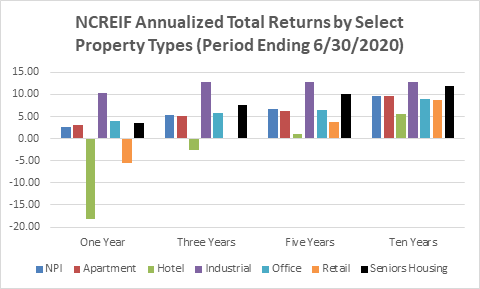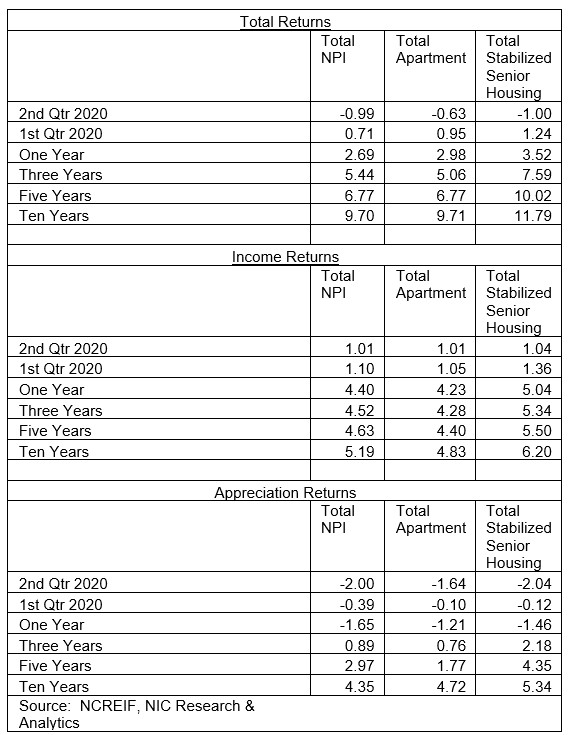Like many property types, seniors housing investment returns fell in the second quarter of 2020 as the effects of the COVID-19 global pandemic and the utter collapse of the economy took their toll. The total investment return for the seniors housing sector was a negative 1.00% in the second quarter of 2020, the first negative return since 2Q 2012.
The income return remained positive but was the smallest increase on record as far back as 2003. The appreciation return fell 2.04%, the third consecutive quarterly decline, making the valuation return a negative 2.43% since 4Q 2019. Many investors reduced their appreciation expectations in the first half of the year as the impact of the coronavirus weighed heavily on their view of the sector.
Comparatively, the total negative return of 1.00% was on par with the NPI which fell by -0.99%, but was slightly worse than the apartment sector performance, which dropped by -0.63%. Hotels plunged by a whopping 16.59%, retail by 3.85% and office by 0.50%. The only sector that did not see declines was industrial, but even there, the appreciation return was negative, albeit slightly (- 0.07%). It is notable that, like other property types, transaction volumes were very limited in the second quarter, making price discovery challenging.
The annual total return through the second quarter of 2020 was 3.52%, outpacing the NCREIF Property Index (NPI) result of 2.69% and the apartment result of 2.98%. On a ten-year basis, total returns are higher at 11.79% for seniors housing—more than 2 percentage points higher than the NPI or apartment returns. The total annual return for seniors housing has been trending down since mid-2014 when it peaked at 20.37%. This pattern can also be seen in the broader NPI index and is due to the appreciation return which tends to slow at this point in the real estate cycle.
These performance measurements reflect the returns of 123 seniors housing properties, valued at $6.3 billion in the second quarter.


See my full Quarterly Highlight in the recent National Council of Real Estate Fiduciaries (NCREIF) Real Estate Performance Report.
About Beth Mace
Beth Burnham Mace is a special advisor to the National Investment Center for Seniors Housing & Care (NIC) focused exclusively on monitoring and reporting changes in capital markets impacting senior housing and care investments and operations. Mace served as Chief Economist and Director of Research and Analytics during her nine-year tenure on NIC’s leadership team. Before joining the NIC staff in 2014, Mace served on the NIC Board of Directors and chaired its Research Committee. She was also a director at AEW Capital Management and worked in the AEW Research Group for 17 years. Prior to joining AEW, Mace spent 10 years at Standard & Poor’s DRI/McGraw-Hill as director of its Regional Information Service. She also worked as a regional economist at Crocker Bank, and for the National Commission on Air Quality, the Brookings Institution, and Boston Edison. Mace is currently a member of the Institutional Real Estate Americas Editorial Advisory Board. In 2020, Mace was inducted into the McKnight’s Women of Distinction Hall of Honor. In 2014, she was appointed a fellow at the Homer Hoyt Institute and was awarded the title of a “Woman of Influence” in commercial real estate by Real Estate Forum Magazine and Globe Street. Mace earned an undergraduate degree from Mount Holyoke College and a master’s degree from the University of California. She also earned a Certified Business Economist™ designation from the National Association of Business Economists.
Connect with Beth Mace
Read More by Beth Mace